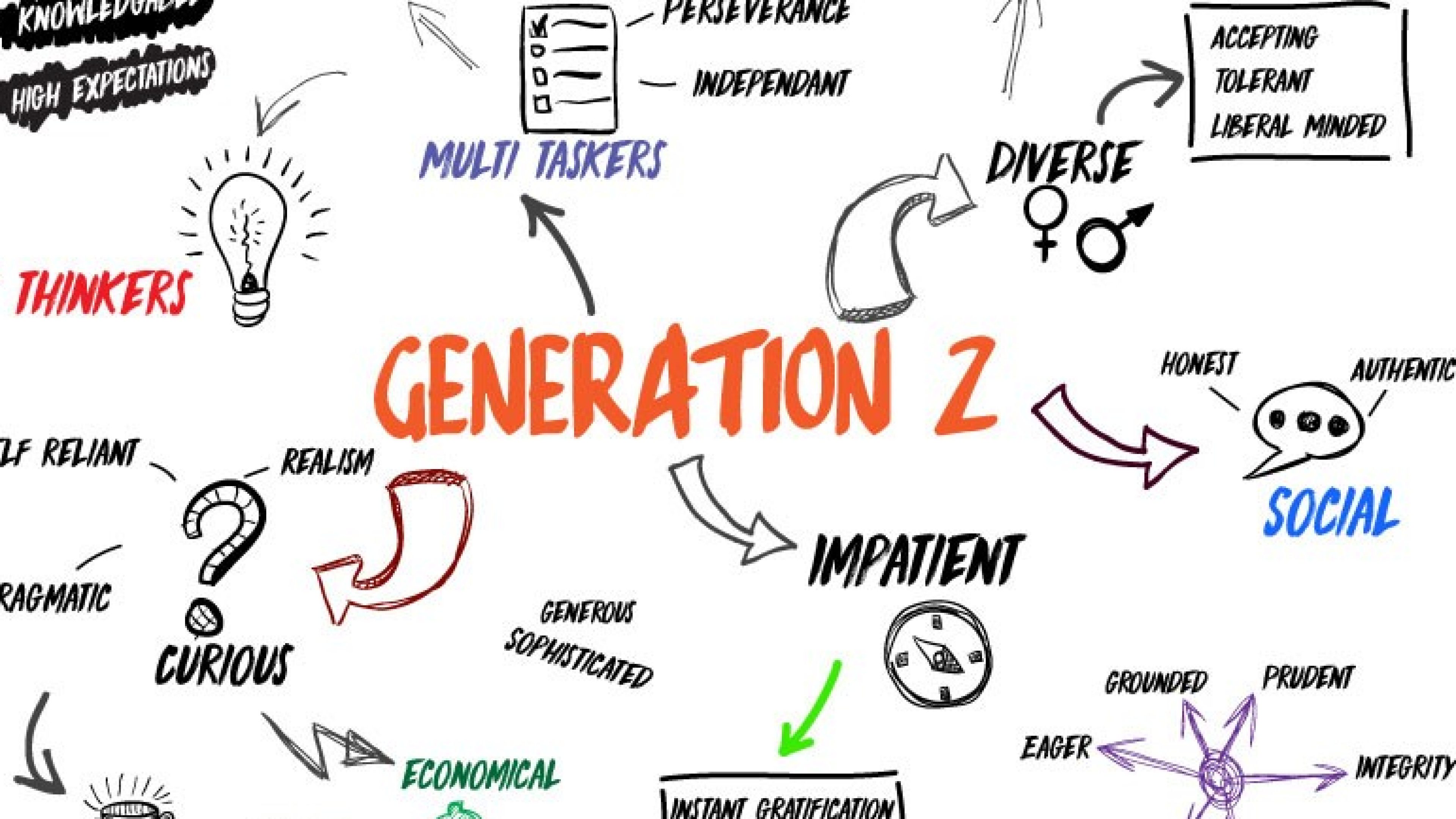In the next ten years, every organization will go through a dramatic change because Generation Z (currently 5 to 22 year olds) is joining the workforce. Companies that fail to grasp the profound implications of this shift will find themselves ill-prepared.
Foreword
The next generation
We will discuss the sociocultural trends, values and behaviours that are shaping Generation Z. Two behavioural drivers are particularly important, namely their realistic mindset and their make-it-happen mentality. These impact Generation Z’s relationship with money, attitudes towards work and career and, of particular interest to our clients, their approach to mental wellbeing.
We are all experiencing a steady increase in disability premiums, often as a result of increased mental health related claims. Research strongly suggests that Generation Z suffers more than any other generation from mental health problems. We need to start thinking critically now about how to proactively address this and enable Generation Z to make decisions about their mental wellbeing.

FACT CHECK
- 40% of the world population belongs to Generation Z
- There will be almost one billion Generation Z’ers in 2030 in Asia alone
- 25% of the US population is from Generation Z
The formative years define the generation
Sociologists tell us that humans are programmed during their formative years – the period between ages 10 and 25. During this time, social, economic and cultural environments, plus parenting and educational styles, greatly influence behaviour, needs and expectations. Numerous studies have shown that formative years not only influence the individual, but they also determine the mindset and behaviour of the entire generation, which they carry throughout their lifetimes. These academic insights are more valuable than those gleaned from conventional methods, like focus groups, because they provide context to the generation’s behaviour.
Given big differences by country in the nature of the formative years, it is not surprising that research is showing differences across Generation Z. However, given how connected this generation is, they are sharing a common experience of disruptive world events. For example, events like a terrorist attack in France’s Bataclan, China introducing a social credit system, Angela Merkel telling German youth “Wir Schaffen Das”, economic growth in South-East Asia, Brexit, extreme storms in the US, and having perhaps the most famous Gen Z’er, Greta Thunberg, coined as the Times Person of the Year… No doubt the coronavirus outbreak will play a dominating role in this common experience.
Generation Z is realistic
Generation Z has the typical teenage concerns about fitting in. However, despite their young age, they are also making sensible and cautious lifestyle choices to plan for a more confident future. Their experiences explain why.
Generation Z is living through uncertain times. They are witnessing both adverse and positive change. They have seen multiple terrorist attacks, the proliferation of ISIS, stalled debates on climate change, political protests led by youthful activists, a refugee challenge and, in the US, the dangers of school shootings. They have also seen many positives. The USA elected its first black president, and same-sex marriages have been legalized in many countries. There have been improvements with gender equality, and rapid technological advancements everywhere around the world.
For Generation Z, their sense of realism stems from an expectation that things can, and probably will, go wrong one day and the sense that there are lots of opportunities that could help to create a brighter society.
Numerous studies have highlighted a growing gap between the state of the world and how it is perceived. Against most critical measures, the human experience is improving rapidly. Levels of war, violence and poverty are in decline, while wealth, happiness, and equality are improving.
Despite these facts, by a wide margin, Generation Z is the most pessimistic about the future. We note there are some stark differences between developed markets (negative) and emerging markets (positive). In addition to their realism, one factor that explains the intensity of their pessimism is intensity and immediacy of their experience of adverse news via social media.
Fortunately, one manifestation of their worries for the future is their activist behaviour on the issue of climate change. This isn’t just about protesting; it is realized in their desire and choice to work for companies with a compelling social mission.
Attitudes towards money
In a global survey covering 20 countries and 20,000 members of Generation Z, 51% of participants said money was one of their main sources of anxiety (Varkey Foundation, 2016). Although money concerns are hardly unique to Generation Z, the strength of their response is noteworthy.
Here, the experience of their Generation X parents is having an impact. Many will have seen their parents suffer through the 2008 financial crisis. Some will have moved or seen close friends move, as a result of the downturn.
What they are witnessing amongst their millennial “cousins” is also playing a part. They see them under pressure because of debt they are carrying, often to secure a home.
TrendsActive researchers have found surprising levels of consistency across the globe in studies of savings amongst Generation Z. Despite the need to live on their pocket money, Generation Z is placing a strong emphasis on saving as they make decisions now to plan for the future.
Revival of the corporate career
Related research conducted separately by McKinsey and Accenture found a shift in attitudes towards careers. Generation Z values stability over high pay. We might indeed see a revival in the corporate career, supported perhaps by some gigs on the side.
An easy conclusion to draw is that this desire for security and stability might hold Generation Z back from pursuing their most ambitious goals. However, a critical counter-balancing influence on their prospects is their make-it-happen mentality. We explore this trend next.
The make-it-happen mentality
Generation X parents want their children to be more independent and well prepared for the future. Mom and dad have not sugar-coated anything. They want to make sure their kids have the knowledge and tools they need to deal with the harsh realities of today’s world. Being raised by sceptical Generation X’ers means Generation Z has been told that they are part of a generation that can’t be promised a better future. They are well informed about the benefits of hard work and taking life seriously, which is inspiring self-determined attitudes.
72% of survey Generation Z members believe happiness is a choice (Tapery 2016). In many countries, today’s teens smoke and drink less. They are less sexually active. Why? Because they want (or need) to be productive to make it happen in life (Snap Inc & Global Web Index, 2019) – to see the choices they make have a positive lasting impact on their lives.
The downside is an emerging mental health crisis. Generation Z has high expectations from life and from themselves. They spent on average 4 hours and 15 minutes a day on social media where they see a stream content showing people leading idyllic lives in this ‘performance society’. Sociologists argue that the impact is not just on an individual but is best understood by recognising the impact on the perception of social norms.
Practically speaking, Generation Z has more life choices than previous generations. With this freedom and flexibility comes the pressure to make the right choices. In combination, these factors can have an adverse impact on mental health.
Again, the evidence of change is stark. Analysing multiple research reports leaves us to conclude that global young people do not have good overall emotional wellbeing. Things like not thinking about their problems too much, feeling anxious, being bullied, feeling unloved or lonely – are all part of young people’s lives. Over half (54%) of Gen Zs already express concern with stress compared to 41% of Gen Ys. (Randstad, 2019).
Perhaps it is not surprising, therefore, that the WHO predicts that by 2030, depression will be the number one disease globally. This is doubly concerning to employers and insurers because the research is unambiguous about the direct link between mental and physical health.
In recent years, personalities such as Billie Eilish, Kanye West and Lady Gaga have spoken out about their struggles with their mental health and what they have done about it.
As a result, mental health no longer carries the same stigma it had in previous generations. Generation Z and modern corporate leaders understand the impacts of wellbeing. This change in awareness and willingness to engage is a cause for optimism when it comes to bending the curve on the projections our research has uncovered. We believe supporting Generation Z by enabling freedom of choice and through education in making good choices will be central to delivering that outcome. Also, recognising the immutable genetic component to mental health challenges, employers will need to show increased sophistication in the way they design pathways to recovery for impacted workers. These are topics we will turn our attention to in the next white paper.
For now, we note that by avoiding conventional marketing research sources, and instead deriving insights from the human sciences like psychology and sociology, we have tried to give you a deeper understanding of the forces shaping Generation Z. We have emphasised how their formative years have shaped their realistic mindset and their self-determined mentality. Taking a human perspective on Generation Z provides us with the necessary context to understand their differing perspectives on finance, work and careers as well as mental wellbeing. Employers need to think differently about their approach to supporting Generation Z compared to previous generations. Those that do this well will play an important part in enabling our society to flourish.
Corona crisis
This white paper was written before the corona crisis. It is expected that Generation Z’s realistic mindset will be amplified by the corona crisis. Furthermore, the job market will change radically. Talented Generation Z’s had lots of opportunities to make it happen in live. Many organizations were looking for the right talent and wondering how to keep them within the organizations. This will probably change as jobs become more scarce. As many Z’s and/or their parents will suffer from the health and economic crisis resulting from corona, we expect more pressure on their mental wellbeing too. Hopefully, their activist and make-it-happen mentality unleashes creativity and makes them resilient enough to cope with the crisis.
Author
Head of Inspiration at TrendsActive

Aljan De Boer
Aljan de Boer is Head of Inspiration at TrendsActive (www.trendsactive.com). He also acts as a board member of the Dutch Platform of Innovative Marketing. Aljan has been widely recognised as an inspiring professional speaker on the critical trends that will shape society, companies and customer experiences in the decades to come.
About TrendsActive
TrendsActive is the first consultancy turning sociocultural trends into actionable strategies to ensure future relevance for organizations. Our trend researchers keep a tap on the world’s best research and knowledge. An important part of our work is to contextualize popular research with insights from the academic field of the social sciences like sociology, anthropology and psychology. These findings help us to better understand Generation Z on a human level. Together with Swiss Life we have outlined some of the most important findings on Generation Z and contextualized it with insights from the human sciences. This will give an extensive overview and in-depth description on Generation Z’s attitude towards the relationship between wellbeing and work, and the implications for Swiss Life and its partners from the global Network.
